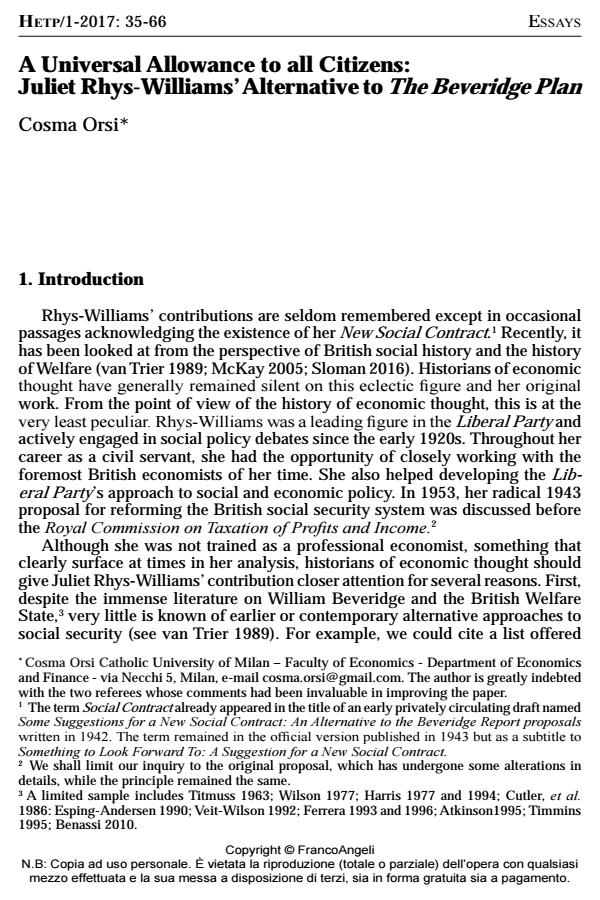A Universal Allowance to all Citizens: Juliet Rhys-Williams’ Alternative to The Beveridge Plan
Titolo Rivista HISTORY OF ECONOMIC THOUGHT AND POLICY
Autori/Curatori Cosma Orsi
Anno di pubblicazione 2017 Fascicolo 2017/1
Lingua Inglese Numero pagine 32 P. 35-66 Dimensione file 283 KB
DOI 10.3280/SPE2017-001002
Il DOI è il codice a barre della proprietà intellettuale: per saperne di più
clicca qui
Qui sotto puoi vedere in anteprima la prima pagina di questo articolo.
Se questo articolo ti interessa, lo puoi acquistare (e scaricare in formato pdf) seguendo le facili indicazioni per acquistare il download credit. Acquista Download Credits per scaricare questo Articolo in formato PDF

FrancoAngeli è membro della Publishers International Linking Association, Inc (PILA), associazione indipendente e non profit per facilitare (attraverso i servizi tecnologici implementati da CrossRef.org) l’accesso degli studiosi ai contenuti digitali nelle pubblicazioni professionali e scientifiche.
Studying the social and economic ideas underpinning political debates offers a deeper understanding of policy decision-making and institutional change. According to a well-established tradition, policies "can be regarded as embodying ideas about society, the economy, the state, citizens and relations between these. They embody views about justice, equality and individual responsibility" (Alcock et. al. 2000: 184). With this in mind, we shall investigate Lady Juliet Rhys-Williams’ critical reflections on the Beveridge Report and the alternative proposal she presented in Something to Look Forward to (1943). In this book, she elaborated an integrated approach to social security and income tax aimed at providing "complete security to those classes, especially the independent workers, widows and spinsters, who are not adequately covered by the Beveridge scheme" (Rhys-Williams 1943: vii). At the very heart of her social vision was the idea of distributing a universal allowance (basic income system) to all British citizens (children included). The rationale underpinning Rhys-Williams’ basic income system was the recognition that the problem afflicting British society was the ill-distribution of wealth, that hindered economic growth and prevented the attainment of full employment.
Parole chiave:Rhys-Williams, Beveridge, Basic income system.
Jel codes:B20, B31
- From James Meade’s ‘Social Dividend’ to ‘State Bonus’: An Intriguing Chapter in the History of a Concept Walter Van Trier, in OEconomia /2018 pp.439
DOI: 10.4000/oeconomia.4226
Cosma Orsi, A Universal Allowance to all Citizens: Juliet Rhys-Williams’ Alternative to The Beveridge Plan in "HISTORY OF ECONOMIC THOUGHT AND POLICY" 1/2017, pp 35-66, DOI: 10.3280/SPE2017-001002